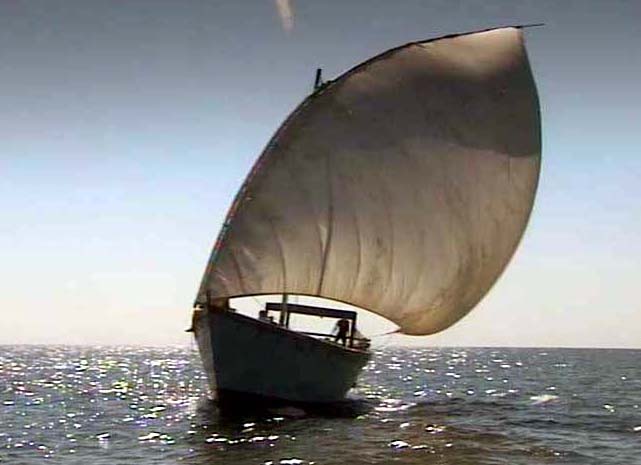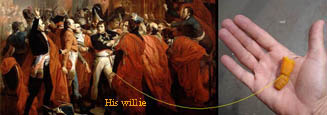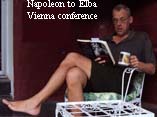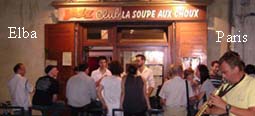
"We need an aristocracy, especially in a free nation where democracy always has a preponderant influence. A government that tries to move itself in one single element is like a balloon on the air, inevitably taken in the direction where where the winds are blowing. But the one that is, on the contrary, placed between two elements, and can use one or the other at will, is not at all subjected. It is like a boat carried by the water mass, and uses the winds only to move. The winds are pushing, but not dominating it. " Napoleon to Benjamin Constant working on a new constitution, Cent Jours, April 1815. Photo: our dhow [more about our dhow, now for sale: details]
A boat: the freedom of the wind, the carrying power of aristocracy and Napoleon steering of course. But the philosopher Napoleon had two practical hitches: the French aristocracy, at least the old part was against him, and there was a war about. Returned, after Elba, to Napoleon's power, France first would have to fight an over-600 000 coalition army of England, Russia, Austria, Prussia and the smaller German princedoms, Spain and Sweden. When Napoleon arrived in Paris, France was reduced to 230 000 troops, 50 000 of which were sent home for lack of military budget, so he was some 400 000 soldiers short, and 250 000 guns, less than two months to go. Napoleon said he could do it but nobody, not even Napoleon himself, was at ease over the outcome of this lightning mega war project, with the opposite party ready, apart from a few weeks of Russian troop movements. The prolonged disagreements between the allies on the Vienna conference now acted against Napoleon because the big shots were still there, apart from the English minister Castlereagh, on behalf of whom the now present Wellington, no doubt the very one to be charged with the military execution, could make trusted engagements, though, (horseback) communication being unfeasible in the time frame, he had to guess what his government would be willing to promise.
To get the war money raised and the preparations made, Napoleon needed support from much more that his former imperial elite. He needed to rally virtually everybody behind him who had been discontented with the Bourbons or could otherwise be made to think favourably about his future in an imperial France. Already on Elba he knew this would require something new: freedom and democracy. The man who had silenced France down to the level where people had not even dared to whisper their opinions to their closest friends, who had controlled the press up to the level on which people generally start believing the opposite of what they read, who had procured himself with totalitarian power to enable him to let France act completely against its own interest, crippling its own economy in a trade blockade and a war killing 600 000 people in a crazy military expedition to Moscow, was now inviting his worst critic Benjamin Constant from his hideout to the Elys�e to draft a democratic constitution. Napoleon tacked and wavered uneasily between posing, mainly to his new enlightened and educated commercial allies as a new, different man, who profoundly learned from experience and, to the common people and the army, as the man called back to France because he was the old emperor his people longed for.
But he had to please all those middle class little Platos, Aristotles, Hobbes', Machiavellis, Humes, Voltaires, Rousseaus, and what have you, their even smaller readers and imitators, in short all those talkative "enlightened" creatures, working at or at least educated by academies and universities, people who had acquired the gratifying potential to ponder a thing that was neither their business nor their practical expertise: government. Napoleon felt he needed their support and planned to give them the toys to deceive themselves in feeling its real: a free press and parliamentary chambers. Despite the obvious problem of the present enmity of all ancient nobility, he went for an English style hereditary chamber of emperor-appointed peers. He insisted on casually calling the democracy plan "Acte Additionel" in order to make his hard core supporters believe he still was the old emperor. Anyway it could be implemented only after the war. Thiers stresses that Napoleon could easily have won the necessary time by installing a constitutional assembly and giving that assembly ample time to make itself ridiculous, but preferred to quickly make make a transparent plan, subject it to traditional imperial plebiscite (a yes-or-no to vote in the registry of municipal mayors) and...shelve it till after the coming war. But in the shelving he failed and had to launch his "boat".
On June 18, only two months later, it sank. At Waterloo. A battle not bound to be lost given the military situation a few days before, he could have done this...that..., if only here....there...but anyway, he lost. By Napoleon's loss, the battle became decisive. Had he won, it would not have been so. It is hard to see how he could have ended the war in power, unless the European alliance would have broken. Ironically, his main former enemy, England, would have been the most likely candidate to break away, not for cabinet and king, but public opinion and parliament were alienated from the Bourbons by their performance, impressed by Napoleon's Elba-to-Paris stunt, as well as by his French popular support, while the fear in England of a return of a continental trade blockade far from matched the abhorrence of new strangling war taxes. Defying and massaging their own public opinion, the English government joined, even led the war and once again helped parachuting the Bourbons.
Bert tells more about the French revolution,
consulate and empire: click on the pictures):




|
|
Bert tells about other reading: Go to:
 Bert
Tells
What He Reads
Bert
Tells
What He Reads

